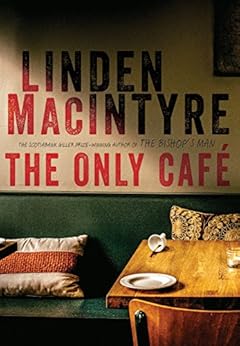 Pierre
Cormier had been a Phalangist militiaman during the Lebanese Civil War before
arriving in Canada as a refugee. Twenty-five
years later at The Only Café in Toronto, Pierre met Ari, a mysterious man who
had worked in intelligence for the Israeli Defense Forces and was, Pierre believed,
in Lebanon during the civil war and involved in the 1982 Sabra and Shatila
massacre. Then, after a major scandal involving
the mining corporation for which he worked as a lawyer, Pierre disappeared, presumably
dying because of a propane tank explosion aboard his boat.
Pierre
Cormier had been a Phalangist militiaman during the Lebanese Civil War before
arriving in Canada as a refugee. Twenty-five
years later at The Only Café in Toronto, Pierre met Ari, a mysterious man who
had worked in intelligence for the Israeli Defense Forces and was, Pierre believed,
in Lebanon during the civil war and involved in the 1982 Sabra and Shatila
massacre. Then, after a major scandal involving
the mining corporation for which he worked as a lawyer, Pierre disappeared, presumably
dying because of a propane tank explosion aboard his boat.
Five years
later, Pierre is finally declared dead.
His son Cyril, an intern at a national newsroom, is conducting research
for a documentary on domestic terrorism but also ends up looking into his
father’s secretive past and his death. He tracks down Ari to find out what he knows
about Pierre and his disappearance.
In the
first part of the book, the author deliberately obfuscates. This evasiveness and the narrative’s
different timelines (Pierre’s Lebanese past; Pierre’s final weeks; Cyril’s
present) leave the reader feeling confused.
MacIntyre seems to want the reader to feel how Cyril feels since he
knows little about his father and even less about events in Lebanon during his
father’s life there. The reader gains
clarity as Cyril does.
I knew
little about the Lebanese Civil War and so did some research especially into
the Karantina, Damour, and Sabra and Shatila massacres. Because of my lack of knowledge, I was often
confused. A historical timeline with some
brief explanatory notes would have been really helpful. (i.e. Karantina was a predominantly
Palestinian Muslim slum district in mostly Christian east Beirut controlled by
forces of the Palestine Liberation Organization; in 1976, Karantina was overrun
by militias of the right-wing and mostly Christian Lebanese Front, specifically
the Kataeb Party (Phalangists), resulting in the deaths of approximately 1,500
people, mostly Muslims. The Damour
massacre was a reprisal for the Karantina massacre. Damour, a Maronite Christian town, was
attacked by Palestine Liberation Organisation units. Part of its population
died in battle or in the massacre that followed, and the remainder were forced
to flee. The Sabra and Shatila massacre
was the killing of civilians, mostly Palestinians and Lebanese Shiites, by a
militia close to the Kataeb Party, carried out virtually under the eyes of
their Israeli allies.)
Sometimes I
felt rather overwhelmed by trying to keep the politics straight. Occasionally, it is also difficult to
determine who is speaking because there are long stretches of dialogue with no indication
of the speaker. There are also events
that take focus away from the main storyline.
For instance, what is the purpose of including Cyril’s on again/off
again romantic relationship?
A more
significant issue is the portrayal of Cyril.
He is an intern who knows little about domestic terrorism and the radicalization
of youth, yet he is chosen to be part of a team working on a documentary on the
topic. He “became quickly lost as the
discussion shifted to Syria and its potential to cause havoc in Lebanon,” but
he’s told, “’I hear you’ve made a strong impression’”?
A major
theme is that the past is never dead: “The
past is never dead as long as there is memory.
Memory is the afterlife, both hell and heaven.” Cyril is told that “’there is no distinction between
what’s historical and what’s contemporary.’”
Events in the novel certainly bear this out. Pierre’s fate, for example, is a direct
result of events in the past and Cyril’s life has certainly been impacted by the
past his father could not escape or totally forget. On a broader scale, current events often have
their nascence in long past events.
There is a
great deal in this novel; in fact, sometimes, it seems that there is too
much. It is a book I should probably
re-read because I think there is much I missed.
There is mystery and suspense, but not a conclusive ending. Considering the book’s theme, such an ending
is appropriate. I recommend the book but
with the suggestion that the reader first read a bit about the Lebanese Civil
War.
Note: I received an eARC of this book from the
publisher via NetGalley.
No comments:
Post a Comment